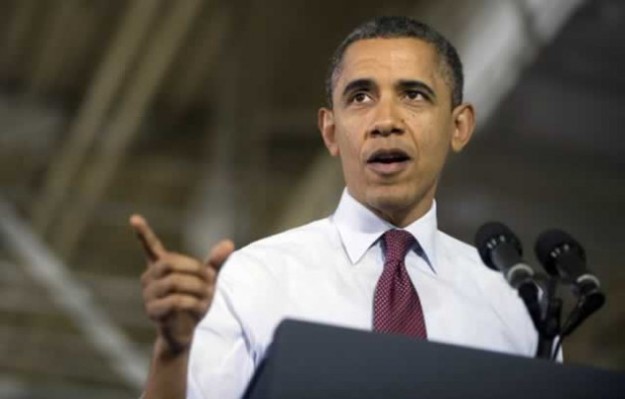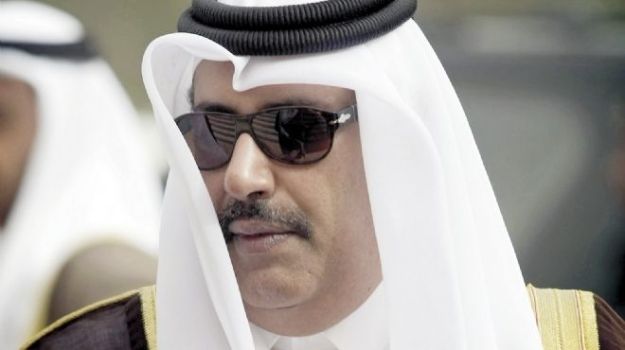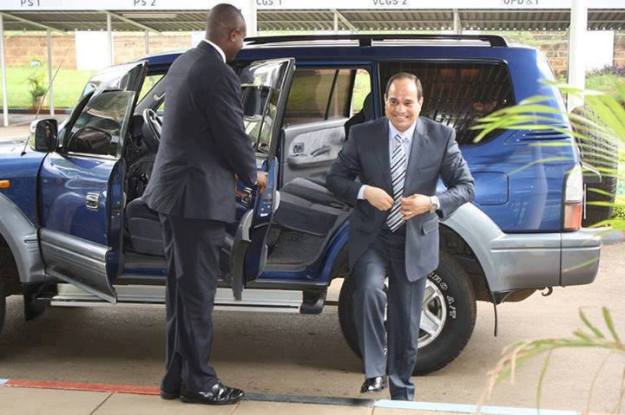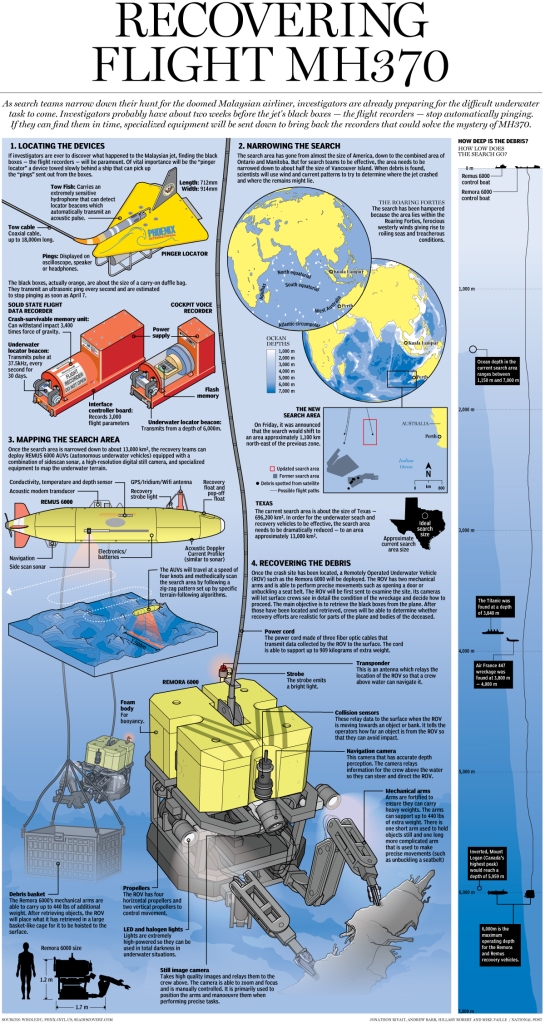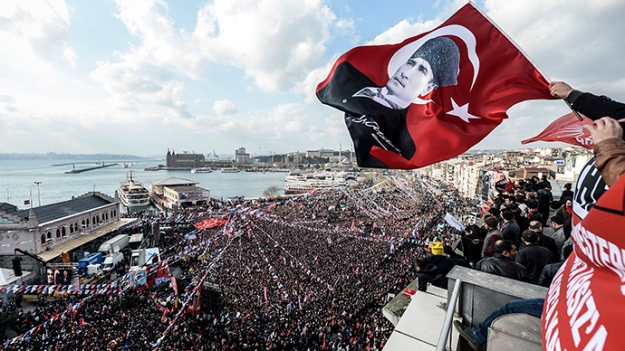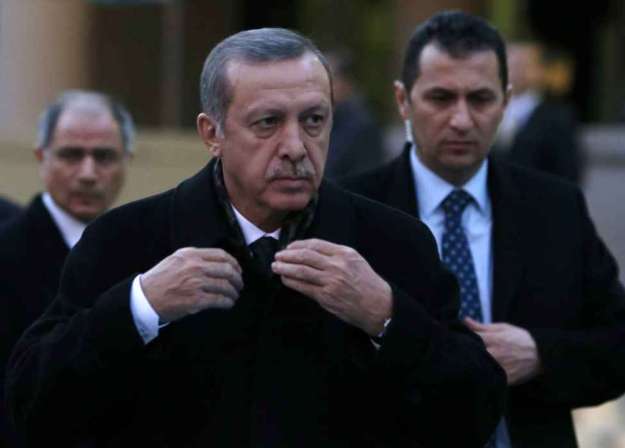
The West is inconsistent in not recognizing the Crimea referendum as legitimate, while recognizing the military coup in Kiev, Russian FM Sergey Lavrov said. He accused the EU and US of duplicity and described sanctions as a “dead-end track.”
If the West accepts Kiev’s coup-appointed government then it must, in turn, accept the legitimacy of Crimea’s referendum to join with Russia, Lavrov told Irada Zeinalova, the host of the “Sunday Time” analytical program on Russia’s Channel One TV.
Q: Last week was eventful and quite challenging. You met the representative of the Ukrainian delegation on the margins of the Nuclear Security Summit in The Hague. It was the first meeting at the foreign ministers’ level under the current circumstances.However, the only thing the wider audience saw of this meeting was one photograph and only one comment from you. Could you expand a little more on this meeting? What was its general tonality? Obviously, only you could know such things as whether the parties were or were not ready for negotiations.
Sergey Lavrov: The meeting took place in a calm atmosphere; there was nothing edgy, just a normal talk. I gave my agreement for this contact since I believe it never hurts to use an opportunity to share our vision of possible solutions to the serious crisis in Ukraine with the representatives of the current Ukrainian authorities directly, and also in view of the fact that at the current stage, Kiev is failing to set up a nationwide dialogue based on mutual respect that would equally account for the interests of East and South, as well as other areas of Ukraine, a neighbourly country to us.
‘Ukraine needs end of violence, constitutional reform and federalization’
I confirmed the validity of the proposal we made a while ago, pertaining to the necessity to implement all of the issues registered in the Agreement of the 21 February and signed by Yanukovich, Yatsenyuk, Tyagnibok, Klitchko and Foreign Ministers of France, Germany and Poland. First and foremost, order has to be restored in all cities, all illegal weapons must be surrendered, all buildings that have been taken over illegally must be released, all barriers from streets and squares must be removed, and there must be no more “Maidans” or “mini-Maidans.”
Once these obvious steps aimed at restoring normal law and order are undertaken, the constitutional reform process should be started immediately, which is something that has also been captured in the Agreement of the February 21. We are convinced that the success of this reform can only be ensured by participation of all political forces and movements representing all areas and regions without exception, and each of them must have an equal decision-making opportunity within the framework of these negotiations.
We are convinced that it would be impossible to work out solutions to all of Ukraine’s problems without a unanimous agreement on the introduction of the federal form of government in Ukraine. Each region needs to have the opportunity to elect directly its local authorities, the executive branch and the governors, and to have all the rights and needs of its citizens satisfied across all spheres, including economy, finances, culture, language, social activities or the right for friendly relations and travel to neighboring states, be it Poland, Lithuania or Russia.
We know from experience that the unitary state does not work in Ukraine. After every presidential election they change the Constitution: first they give more power to the president, then to the parliament, after that to the government. This merry-go-round cannot last for long. Federalization is a way to make all the regions feel comfortable, so that every region will know that its rights are being respected. And at the national level, they will have certain things in common, like defense, foreign policy, judiciary. We would be willing to do that – I mean guarantees that external players would offer to Ukraine after it implements these reforms.
I had pretty long conversations with US Secretary of State John Kerry, German Chancellor Angela Merkel and leaders of other EU member states, and it seemed to me that they know much more about the reforms planned by the parliament and the government it appointed than our Ukrainian counterparts.
‘Rights of Russian-speakers in Ukraine are not guaranteed’
Q: Did the Ukrainian counterparts explain to you how are they going to take into account the interests of the eastern and southeastern parts of Ukraine if their constitutional reform does not involve the Russian language and the rights of Russian-speakers?
A: I didn’t ask them about that. Like I said, they answered that the parliament had set up a special commission, even though we haven’t heard much about it, and that this commission can incorporate into their work a lot of the proposals coming from southern and eastern regions. But I would say it is impossible to do that without inviting all the regions to participate in the body working on the constitutional reform. But so far there has been no such invitation.
‘Russia’s troops in their right to relocate on own territory’
Q: On one hand, US Secretary of State John Kerry, German Chancellor Angela Merkel and other Western politicians claim they are ready for dialogue. But they always qualify that by saying, “unless Russia continues to escalate the confrontation.” By “escalation” they mean our potential actions to protect the rights of Russian-speakers in eastern and southeastern Ukraine. Why do they keep insisting on this? Just this week, NATO reported that our troops were concentrated along the border.
A: Russian troops are deployed on our territory. From time to time, they have scheduled and unscheduled, surprise exercises. Every respectable nation does that if it wants its armed forces to be combat-ready. Our recent exercise was transparent and fully met all the OSCE standards. We have duly notified our partners about it. After we received requests from other nations, we allowed foreign inspectors, including some from the US and Ukraine, to monitor the exercise.
There is an Open Skies Treaty, which allows aerial surveillance flights over the territory of treaty member states, and such flights took place just a couple of weeks ago following a request by Ukraine. Foreign monitors filed their reports after the inspection, and there was nothing in those reports suggesting that those movements of Russian troops presented any threat. We are not plotting against anybody, and we are still open for a frank conversation. But please note that every nation has the right to move troops around its territory.
‘If West accepts coup-appointed Kiev govt, it must accept a Russian Crimea’
Q: Talking about the Constitution and constitutional reforms in Ukraine, there is an impression that they only bring up this topic now in connection with Crimea. Why our western partners ignore all the constitution and human rights violations done by those who organized the Maidan protests? Does the West deliberately turn a blind eye on all those violations? Or maybe they are just not aware of them?
A: This is a big question. Unfortunately, I think they do this deliberately. From the very beginning of the certain events in Ukraine, in early November, when the Ukrainian president made a perfectly legitimate decision to postpone the signing of the Association Agreement with the EU (just to postpone it, mind you, not to cancel it altogether!), the protests started on Independence Square, with protesters putting up tents, setting up mobile kitchens, portable toilets, etc., and very soon militants from the Right Sector and other radical groups appeared on Maidan — we warned Western countries against patronizing them. They responded, rather indistinctly, that those were legitimate expressions of civilian position. Although, even at that point it was clear that those protests were turning unconstitutional and anti-governmental.

And then there was a coup, which happened just the next day after President Yanukovich signed an agreement with the opposition in the presence of the foreign ministers of three EU nations. Immediately, they said that a revolution had taken place and that we had to face the facts. They still say that today, when we say that what happened was illegitimate. The PACE committee on legal affairs decided to request an opinion from the Venice Commission as to whether what happened in Ukraine was legitimate, but the motion was blocked. The Venice Commission did not receive the request, largely due to the secretariat of the Council of Europe manipulating various technical regulations regarding Council of Europe activities.
‘West refuses to accept awkward reality’
They keep on telling us that “When it’s gone, it’s gone,” “it can’t be undone,” “let bygones be bygones,” and “let’s be constructive about it and think how you can call off your decision regarding Crimea.” I’m not exaggerating; that’s literally what they keep saying to us. My response is very simple. Even if we don’t compare the legitimacy of what happened on Maidan and what happened in Crimea (and I am absolutely sure that the first was an unlawful act while the latter was the expression of the will of the people, with so many people voting in favor of reunification with Russia, it is simply impossible to challenge) — so, even if we forget about that, it makes absolutely no sense for a diplomat to say that you have to accept what happened on Maidan as reality but what happened in Crimea is not reality. This is a dirty trick. If they are willing to accept the first reality, then they definitely have to accept another one.
‘We had no other choice for Crimea’
Q: You are Russia’s top diplomat. As the decision regarding Crimea was being made, you certainly considered the possible reaction of the western counterparts. Does reality match your expectations? Did you expect a more moderate or a tougher response?
A: We cannot do otherwise but consider the consequences of every diplomatic step we take. In this case, it was not an act of diplomacy; it was a fundamental step of national importance. Besides that, this issue could not be held dependent on a negative, positive or any other sort of reaction from other countries that had nothing to do with it. After the Crimean referendum made it absolutely clear that the people of Crimea want to be with the Russian Federation, we had no choice. Frankly, the Russian leadership in general and the president in particular did not have any other choice. We could not betray ethnic Russians and Crimeans after they made their choice through an extremely democratic and transparent procedure.
‘Western sanctions vs Russia a decent way of expressing offense’
Q: The reaction we’re receiving from the West is sanctions. The officials in the Parliamentary Assembly of the Council of Europe are very weird; they say they want to expel Russia from PACE. How serious would it be if Russia has to leave this political forum? Did you expect such a strong reaction? Although some people say it’s softly.
A: We didn’t bother to ponder what kind of reaction we’ll see. We had no choice. The choice we made was based on all of our modern history, on the international law, on Russia’s statehood, on our responsibility for the ethnic Russians who suddenly found themselves living in another country. And the way it happened had nothing to do with international law.
You know how the agreements in Belovezhskaya Pushcha (to break up the Soviet Union) were accorded, when those who talk so much about international law today gave a standing ovation to that act. They had no reservations about the legitimacy of what happened back then.
As for introducing sanctions – this is a dead-end track. There is a feeling that our Western partners have been working to ‘tear’ Ukraine away from Russia for years. When they realized that they were wrong and that they had made a mistake by undermining all the agreements we made after the collapse of the Soviet Union, they couldn’t admit it. Misunderstood feeling of pride got involved. So the reflective sanctioning we’re observing right now looks like an attempt to express their frustration through the most possibly decent means.
I’m not mincing words now, because I tell the same to my [foreign] colleagues. In our one-on-one conversations, they all ask me to understand the situation and walk in their shoes, because “the West cannot put up with such developments,” they say that “We do understand you, but we are a team, and we all have to speak with one voice.” But this is something from the previous era, when there were two blocs, two geopolitical strategic opponents facing each other. Back then, it was “either-or”; “either you’re with us or you’re against us.” We have left this concept behind long time ago. But, unfortunately, many decision-makers in the West still have this mentality.
I’m not saying that these sanctions are ridiculous or that we don’t care about them. They are nasty. It is very obvious that the West wants to make sanctions look personal, to present them as if they target individuals. Well, we don’t enjoy those sanctions but we don’t feel any pain either. We’ve seen much harder times.
‘Russia won’t obey the western rules’
Russia’s relationship with the West has been quite eventful in the post-Soviet period. We were welcomed to the democratic world, because they expected us to follow their orders and observe all the rules created by the west in this segment of the Christian civilization. This is not partnership, but rather an attempt to take under control a non-aligned geopolitical ‘turf’. We saw that attitude exposed in developments in Ukraine. We saw how desperate the West was to drag Ukraine into its orbit, without paying attention to the interests of the Ukrainian economy, culture and the nation. Ukraine is a very complex, multi-ethnic and multicultural country. The ultimate motive behind all that was to separate Ukraine from Russia. Remember how Zbigniew Brzezinski said that with Ukraine Russia is a great power, yet without Ukraine Russia is not something less significant?
Incidentally, I was taken aback by what the US President Barack Obama said about Russia being a regional power and about the costs we will have to pay. We did not lose any lives when we responded to the legitimate choice of the Crimean people. The ‘games’ the American played in Iraq, Afghanistan, Libya, Yugoslavia have cost thousands of lives. There is always a price, but in every case it is different.

‘Countries pressured into voting for UN Assembly resolution on Ukraine’
Q: Do you think that the UN General Assembly vote on the resolution regarding Ukraine and Crimea has demonstrated that the world is no longer unipolar? A hundred nations voted for the resolution drafted by the West, and then there were 93 nations that supported Russia’s position on Crimea, voted against the resolution, were not present or abstained. A hundred and 93 – this is practically parity. Do you think the UN in its current state is capable of responding properly to challenges of the international politics?
A: The pressure mounted in connection with this resolution was extreme. We know there were not just demands to endorse this openly provocative resolution. There were if not threats, then reminders about “consequences”. A country that refuses to toe the line would not get a loan, or some kind of a visit would be canceled.
In addition to officially declared sanctions, other measures are also being taken that amaze us. Our diplomats in EU countries are denied appointed meetings with foreign ministries. We know that the US and EU diplomats in Moscow have been instructed not to attend events where blacklisted officials may appear. This absolutely contradicts the very purpose of diplomacy. Diplomacy is the art of talking and working out agreements. Using diplomats as instruments of your sanction policies is something totally different.
Now a few words about the vote on the resolution and the balance of power in the world. I meet with John Kerry on a regular basis. I am amazed at how the Europeans have delegated the decision-making on the Ukrainian issue to Washington when it comes to relations with Russia. As we have already said on multiple occasions, they talk about setting up a contact group. The idea of this group is that Europe and America will ‘oversee’ how Russia and Ukraine are trying to reach some kind of an agreement. This is unacceptable, because the problem is not in our bilateral relations with Ukraine; the problem is that there is a severe crisis of statehood in Ukraine.
‘West’s duplicity and inconsistency obstructs dialogue over Ukraine’
That’s why we suggested a different approach. If our Western partners agree, Russia, US and the EU might form a support group for Ukraine and address the current Kiev authorities together, encouraging them to open a nationwide dialogue. They should invite all political forces without exception (excluding the armed militants, of course) and all regions to join the discussion as equal partners. As a result, they will produce a new constitution, which will define Ukraine as a federation, reaffirm and guarantee that Ukraine’s status of a non-aligned state, and protect the rights of all the ethnic groups in Ukraine. Of course the rights of ethnic Russians is a priority for us, but the same attitude also applies to Czechs, Hungarians, Germans and other minorities living there.
If our partners are ready, we’re open to the broadest dialogue possible.
But the first step the current Ukrainian authorities must take is offering a hand of friendship to all of the Ukrainian people, to all of the regions, and invite them to an equal and open dialogue regarding the future of their country. If they take this approach, we would be wide open to cooperation.

We don’t have any hidden agenda. We want Ukraine to be a peaceful, stable and friendly nation. We absolutely respect its right to engage in cooperation with Russia, Europe, America and whoever they want. We may achieve a lot if we use this approach.
When we talk to our American partners, they tell us, “First, let’s de-escalate the situation. We should both influence those people who listen to us in Ukraine, encourage them to calm down, stop attacking each other, and engage in some sort of a dialogue.” We are ready to do that, and that’s the message we have been sending. I hope that Americans and Europeans are also sending a similar message (and the events of the last few days seem to indicate that they are).
For example, we have long since asked them to do one simple thing: we asked our Western partners and the current Ukrainian authorities to make a statement regarding their position on the Right Sector – and we’re not even talking about taking measures to prevent the ultranationalists from going out of control. Only recently we started to see the first reactions to our request. That is probably due to the fact that the glorious picture that our Western colleagues had been painting has proven to be wrong and that everyone can see now that involvement with the radical forces can have extremely grave consequences, especially in matters of maintaining power and control.
I hope that the steps the authorities in Kiev are undertaking now to ban the radical formations and to have the agreement for all illegally possessed weapons surrendered fully and unconditionally will be implemented, and I hope that the West will facilitate it.
While inviting us to participate in such a dialogue and assuring us via bilateral contacts of their readiness to facilitate the normalization of the situation, our partners are nonetheless being inconsistent because what they are doing at the same time on public platforms including the UN General Assembly is different: they are encouraging there quite confrontational and contentious statements that are bordering on insults, which is not helping with creating a positive framework for a normal dialogue. This double-standard approach is very disruptive to the process.
‘EU giving visas only to Crimean Ukrainians would be gravest violation of human rights’
Q: There are some leaks from the EU implicating that the citizens of Crimea will only be granted Schengen visas if they apply in Kiev. If this is true and the decision has been made, this part of the sanctions is a pure provocation! To your knowledge, has the decision been made or not yet?
A: As far as I know the decision has not been made yet. But such talks are indeed taking place, and in a quite strange manner at that. The talk is about introducing the rules that would oblige citizens of Crimea wishing to obtain a Schengen visa to enter Ukraine and apply for it at the Ukrainian i.e. non-domestic consular post, and they would need a Ukrainian passport for that. At the same time, they are talking about a visa-free regime to Ukraine for all EU states. Ukraine has unilaterally introduced a visa-free regime for all EU citizens and applied this regime to travel to Crimea. They are discussing such approaches seriously and publicly. They do not talk to us. They are discussing it internally thinking that once they make the decision it will be complied with. This is unacceptable. This is a crude violation of human rights.
People who live in Crimea and have chosen to be Russian citizens have nothing to do with any geopolitical matters. They simply want to live in a state that is home to their language, culture, and their “gene pool.” If the EU goes through with such steps, I am sure will we respond in a way that would make the EU understand the unacceptability of such a grave abuse of human rights.
Q: Will there be a response to Kiev’s announcement about introducing a visa regime for Russian citizens? They seem to be undecided whether to go through with it or not. If they do, is Russia ready to introduce a visa regime for Ukrainian citizens in response?
A: I believe it would be an unwise thing to do. And I think Kiev has already given this idea up. Someone quick-tempered must have articulated the thought. It has already been denounced, so I believe it is not a valid for discussion anymore.
Q: The members of the Right Sector were recently called Kremlin spies, presumably because only enemy spies can damage the country’s reputation to such an extent. Earlier, Yulia Timoshenko implicitly confirmed her statements where she called for bombing of Russia and exterminating the Russian population. Do you bring these extremist statements to the attention of your Western counterparts? Obviously, you can’t turn a blind eye when a presidential candidate is speaking out like this.
A: These statements, of course, are pure rhetoric. The list of presidential candidates features not only Timoshenko, but also figures like Yarosh and Tyagnibok, who is a member of the coalition and the leader of the Svoboda party. The party’s platform still relies on the principles set forth in the declaration signed by Ukrainians in June 1941 which is basically an oath of allegiance to Hitler and his new order in Europe. Again, this is still part of the official platform of the Svoboda party.

‘Moscow has info that Right Sector was behind snipers shootings’
Q: Are we the only people who know about it?
A: No, I mentioned this to my Western partners a few times. When I brought this up, one of my key partners hesitated a bit at first and then said: “We’re watching Svoboda, but they’re members of the coalition and they’re moving towards the political mainstream.” It’s very hard to react to that, because that’s a level of a dialogue with facts in hands. Still, that is how it is.
As for the radials in Ukraine, we keep drawing attention to that. And those who said that Moscow’s hand was behind the Right Sector – I will let it weigh on their conscience.
We have factual information – which I have presented to my counterparts – about whose embassy maintained contacts with the Right Sector, and whose embassy its leaders visited all the time; whose representatives were always staying on Maidan, in the buildings controlled by the Right Sector from there [the movement] was orchestrating many of its acts of violence including sniper shootings. Let it weigh on the conscience of those who were involved in such exercises.
Q: Are you saying it was the Right Sector who coordinated sniper shootings?
A: We have such information.
Q: Did you share this evidence with your Western partners?
A: We have shared our concerns and suspicions with them. I can’t claim that it is 100 percent true, but there are a lot of facts that point to that. Of course, it must be double-checked. I hope that the investigation announced by the current Ukrainian authorities will be completed and won’t be swept under the rug.
Q: We’ve have repeatedly heard that Russian pilots of Russian airlines are not allowed to rest in Ukraine in violation of ICAO (International Civil Aviation Organization) rules. This is a threat to flight safety of both Russian and Ukrainian passengers. The Russian Foreign Ministry says that the situation has not changed. This week it happened again. What can be done in this situation – when it’s a question of the life of our citizens?
A: As far as demands are concerned, we have probably done everything possible. We filed a protest with Ukraine and ICAO demanding that our crews be allowed to leave the aircraft so that they would be able to rest normally in a hotel for several hours instead of sitting crooked and waiting for takeoff. So far, we haven’t received any sensible response. I hope we will get it shortly. You’re absolutely right, it’s a safety problem. Alternatively, we could stop flights [to Ukraine].But I don’t think it is in anyone’s interest.
Q: Don’t you feel that things like not allowing pilots to leave the plane, denying visas for ordinary Crimeans and calling Russia ‘a regional power’ – all these are just some…
A: Petty things.
Q: Yes, petty things. It’s so strange that people may react in this way when the future of a big country, Europe’s and Russia’s partner, is at stake. It’s like cutting off the nose to spite the face.
A: I’m not so much surprised by the pettiness of those who have seized power in Ukraine. But the pettiness of their Western sponsors is amazing.
Q: Unexpectedly amazing?
A: Yes, unexpectedly. Because these are large countries, serious people, supporters of democracy, and defenders of justice. But leaders are becoming petty, and you and I are not the first ones to notice that.
RT News.















